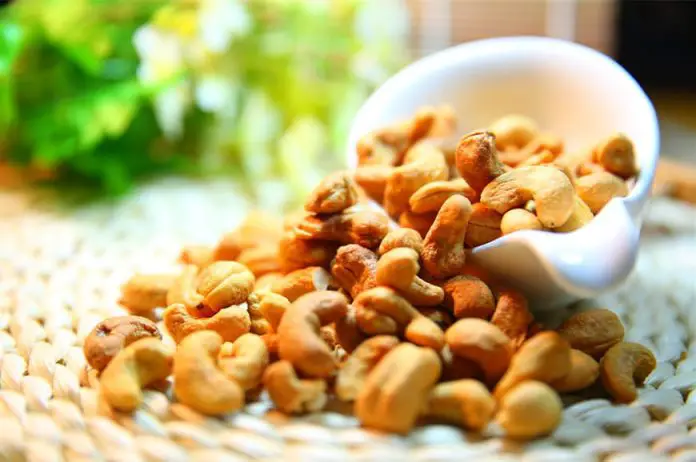Does your dog “go nuts” for nuts? In today’s post, we’ll talk about a nut that is highly sought-after not just by people but also by pets – the cashew! Yes, cashews are considered to be a nut in the culinary industry, although they are technically drupes.
The question is, are cashews safe for dogs? We all know certain nuts, like the macadamias, are a big no-no for our pets. The cause of toxicity of macadamias has not yet been identified by vets and scientists but just to be sure, it is best to avoid them at all costs because they can cause severe neurological difficulties in canines.
What about the other tree nuts, like cashews for instance? Do they contain any poisonous substances? If not, then do they have too much fat or too many calories? Read on to know whether these nuts (or drupes) can be safely given as a snack to dogs.
Can Dogs Have Cashews?
Yes, you can share some cashews with Fido! However, there are a few risks involved so it should only be given in minimal amounts. Cashews are not poisonous to dogs unlike macadamias. They are relatively safe if they have already been cooked and do not contain salt or any type of seasoning.
Uncooked or raw cashews are not safe to eat for people or animals because of their toxic resin content. The toxins in cashews are called urushiol and can cause contact dermatitis. These toxins are eliminated through high-temperature. Like in the case of almonds, cashews can be intensely noxious if not introduced to some sort of heat source.
The raw ones we are talking about are cashews fresh off the tree. The ones readily available on the market have been previously cooked by at least undergoing light steaming.
But just to be sure, consider roasting them for about three hours at 200°F before serving. All you have to do is spread them on a baking sheet lined with parchment paper. You can check their progress and color every 20 minutes.
Many people would agree that cashews already have an amazing and high-class taste. Still, there is a way to improve their flavor even more. Soak them for a few hours! Soaking cashews makes them easier to chew. This process also helps neutralize the enzymes which allow for proper digestion.
Risks of Giving Cashews to Dogs
While cashews are safe for doggies, we can’t deny the fact that there are still risks in feeding them these nuts. Below are some of the possible risks you should keep an eye on.
Risk #1: Allergies
In case your dog previously had adverse reactions to tree nuts, it is best to simply avoid giving him any kind of tree nuts, including cashews. About half of all symptoms of tree nut allergies have something to do with skin itching.
Is it possible for a dog to be allergic to only cashew nuts? Yes, it is. There are humans who are hypersensitive to cashews and not to other nuts. This can possibly happen to dogs too so better observe your pet’s reaction after eating them, especially the first time.
Aside from itching skin, your dog could also show respiratory problems such as shortness of breath and nasal congestion. In most cases, hypersensitive dogs can also show intestinal reactions such as abdominal pain, diarrhea, and nausea.
If any of these symptoms are present, stop giving cashews to your dog and talk to your pet’s veterinarian. Dogs rarely experience nut allergies and not as intense as humans do but those allergies do exist.
Risk #2: High Fat Content
Another risk we see in feeding cashews to dogs is their fat content. An ounce of cashew nuts contains 12 grams of fat. That is equivalent to 18 medium cashews.
According to the Recommended Dietary Allowance for dogs set by the National Research Council, the adequate intake is only 1.3 grams of total fat. The recommended allowance per day is 1.8 grams while the safe upper limit is 10.8 grams.
Supposing your dog accidentally consumed an ounce of cashews, he already ingested more than the safe upper limit of fat per day. The high fat content of cashews can cause your pet to develop an upset stomach.
Aside from causing gastric distress, too many cashews can also lead to pancreatic issues. Pancreatitis or the inflammation of the pancreas can be hereditary. However, it is often caused by high amounts of carbohydrates and fats in a dog’s diet.
If you are very concerned about the high fat in cashews, maybe try to get those dry-roasted varieties. They contain less fat because they were cooked without any added oil. More importantly, be cautious about the number of cashews you are giving your dog.
Risk #3: Oxalate salts
Cashews are among the foods that contain a decent amount of oxalate. This organic acid, usually found in plants, hinders the absorption of calcium.
When your pet is susceptible to developing kidney stones, better avoid giving him cashews and any other types of nuts. Do note that some breeds are more prone to certain types of kidney stones than the others. Breeds such as the Lhasa Apsos, Yorkshire Terriers, and Miniature Poodles are the ones that often develop kidney stones containing calcium and oxalic acid.
What To Do If Your Buddy Accidentally Ate a Lot of Cashews?
Did your dog just gobble down a pound or two of cashews? This will eventually make him sick, especially if the cashews were salted or flavored and too oily. The excess salt and fat could make him thirsty. From such an amount, he could suffer from a gastrointestinal upset characterized by vomiting and diarrhea.
If he’s too thirsty, give him water every two hours. If you can’t be around all day, make sure your pet has access to fresh and clean water. You should also keep an eye for sodium toxicity. The symptoms of sodium toxicity include lack of coordination, muscle tremors, and vomiting.
If vomiting is persistent and the diarrhea is bad, it already calls for an emergency. Rush your pet to the nearest veterinary hospital because he needs better supportive care in such a situation.
Benefits of Cashews to Canines
Despite the high fat and calorie content of cashews, they come with an impressive nutritional value. When prepared right and fed in limited amounts, cashews can be a wholesome treat for doggies. Here are some of the health benefits of these drupes to our pets:
- They can prevent heart diseases. Cashews are packed with healthy fats that are essential for heart health and reducing bad cholesterol.
- They help maintain your pet’s nerve function. Cashews are a rich source of magnesium. An ounce contains as much as 82.8 milligrams of magnesium. This mineral is important for healthy muscles and nerves.
- They can help in reducing weight. While cashews may contain excessive amounts of calories and fat, they can help weight maintenance when consumed in the right quantities. The monounsaturated fats present in cashews help in mobilizing stored fat into free fatty acids that are burned.
- Cashews keep your dog’s immune system healthy. They are an excellent source of copper which can help in metabolizing iron. This eventually promotes the formation of red blood cells.
- They are great for your pet’s oral health. Among their many nutrients, cashews are also a good source of phosphorous which is known for boosting bone and oral health.
- They can help with depression. Did you know that cashews are being used as a natural solution for depression and anxiety? This is because of their Vitamin B6, magnesium, and tryptophan content. These mood-stabilizing nutrients are all beneficial in elevating one’s mood.
- They can improve blood pressure. The magnesium and potassium found in cashews are both helpful in regulating blood pressure. These minerals help relax the blood vessels and counteract the effect of too much sodium in the blood.
- They can prevent certain types of cancer. Cashews also contain proanthocyanins. These compounds are known to stop the replication of cancer cells. The copper in cashews is beneficial in reducing a cell’s inclination to evolve.
Can Dogs Eat the Cashew Apple or Fruit?
As drupes, cashews are in fact a fleshy fruit with a large seed in the center. The seeds, which we normally eat, grow at the base of the cashew apples.
The true fruit, which looks like yellow or red gloves, are edible but they don’t have a very pleasant taste. They also rot easily but they have many uses. It’s best to avoid the cashew apples for dogs especially if they already look putrid.
In some parts of the world, the cashew apple is being used for making liquor, jams, and any other type of preserves. It is also used for making feni, a strong type of alcohol made by fermenting the fruit itself.
Cashew Recipes for Dogs
Cashew Dog Treat Frosting
You can use this as a frosting for your pet’s sweet treats such as cupcakes and biscuits. They are best for special occasions, like on your pup’s birthday or during the holidays! The olive oil and honey give this sweet frosting a healthier twist.
- Put around 1 and ½ cups of cashews in a jar or bottle. Add enough water to cover them all. Soak for 4 hours.
- Drain the cashews and transfer in a blender.
- In the blender, add ½ cup of chicken broth, 1 tablespoon of honey and 3 tablespoons of olive oil. Pulse until everything is well-combined.
- Firm up the mixture by refrigerating for 1 hour.
Flourless Cashew Muffins
No flour? No problem! This Paleo recipe can be given as a snack for doggies. The added honey and banana both give this muffin a natural sweetness while the cashew butter gives the dough a creamy and rich texture. Follow the steps below to try this recipe at home.
- In a blender, combine 3 cups of cashew butter, 4 large eggs, and 2 large ripe bananas.
- Add in ½ cup of raw honey, 1 teaspoon of baking soda, and a pinch of salt.
- Pulse until you get a smooth, thick paste.
- Scoop the batter into a lined muffin tin.
- Bake in a preheated oven at 350°F for 15 minutes or until the top portion looks golden brown.
How to Select Fresh Cashews for Your Pet
Cashews and all foods, in general, can be harmful to dogs when they are moldy. The molds can make your pet extremely ill. Therefore, make sure your pet only eats fresh cashews. How will you know if the cashews are still good to eat? Look for these signs of freshness when buying cashews:
- No evidence of moisture
- Not shriveled
- No rancid odor
As oil nuts, cashews can develop an odor or taste when exposed to moisture. It’s best to discard them if they already have an unpleasant smell or taste. This indicates that the cashews are moldy and are no longer safe for anyone’s consumption.
The proper storage of cashews is as important as picking the fresh ones at the grocery. They have the tendency to go rancid quickly due to their high fat content. Avoid this from happening by storing them in an airtight container in a cool and dry place.
Conclusion
Cashews are among the safe human foods for dogs. So go ahead and let your buddy go nuts with a few pieces of these delicious nuts! Just remember three things when offering cashews to dogs: they should be given in small amounts, unsalted, and roasted. Given in moderation, cashews may provide the health benefits your dog needs.






















